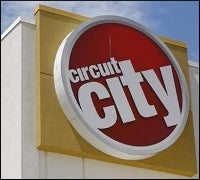 |
| Source: Reuters |
Circuit City said on Friday that it would close down all of its U.S. stores, after failing to find a buyer — removing another player in the dwindling market of national electronics retailers and ending the long run of one of the nation’s largest purveyors of PCs and home electronics.
The company had been looking for a buyer to keep it alive, but the crippled credit market prevented this from ever happening. At one point, it was in talks to merge with video rental giant Blockbuster, but Blockbuster backed out of the deal, according to reports.
As a result, it now plans to liquidate its remaining 567 U.S. stores. It did not provide a timeline for when it expects to complete the move. In November, Circuit City announced it would close 155 underperforming stores in an attempt to stave off disaster. The company also filed for Chapter 11 bankruptcy protection later that month, after vendors began withholding merchandise over doubts that it could pay for the products.
The closures could put as many as 35,000 employees out of work. It has not said if it will retain its online business through CitcuitCity.com.
“This is the only possible path for our company,” James A. Marcum, Circuit City’s acting CEO, said in a statement. “We are extremely disappointed by this outcome.”
It might not completely be the end for Circuit City, however. Stephen Baker, vice president of industry analysis for NPD Group, thinks the company’s name will live on, post-liquidation.
“Just as someone saw the value in the name of CompUSA, I think you’ll see someone swoop in and grab this name, because the name still has strong consumer recognition,” he told InternetNews.com.
CompUSA, another rival in the electronics retailing industry, went bankrupt and liquidated in 2007. But in January 2008, computer hardware firm Systemax acquired the CompUSA brand, trademarks, e-commerce business and the right to open CompUSA retail outlets in Florida, Texas and Puerto Rico.
Systemax also owns the TigerDirect mail order business and retail outlets. It has since converted 14 TigerDirect stores to the CompUSA name.
For Circuit City, its brand name is stronger than its management, Baker argued. “Just because you have strong name recognition doesn’t mean the other guy has a stronger recognition and you’ve been executing at a level you need to be successful,” he said. “The decline has been going on for a while. This is the cumulative effect of mistakes and missteps over a long period of time.”
Circuit City made three big mistakes, he added. For starters, it didn’t get into music and movies fast enough in the mid- to late ’90s, when those categories were becoming key to driving people to stores.
Baker also said Circuit City lost focus by supporting boondoggles — like auto sales through its CarMax unit, and DIVX, a movie rental system that relied on a DVD-like format and specialized hardware for playback. The gaffes cost it millions. Then in 2001, Circuit City stopped selling appliances and got rid of commissioned sales people, he added.
“All of that was what distinguished them from Best Buy,” Baker said. “They cut those away and started to look like Best Buy.”
The bad news for consumer electronics makers now is that there are only two major, national retailers: Best Buy and Wal-Mart. After that, there are only regional players that don’t have the strength of the two big names, and Best Buy and Wal-Mart are in a more dominant position to throw their weight around with manufacturers.
Or are they? Baker said consumer electronics sales grew faster online than in stores, making the brick-and-mortar dominance of both giants a little less certain.
“The percentage of online sales for 46-inch and above TVs was higher for online than brick and mortar,” he said. “People are willing to buy pretty much everything at this point online.”


